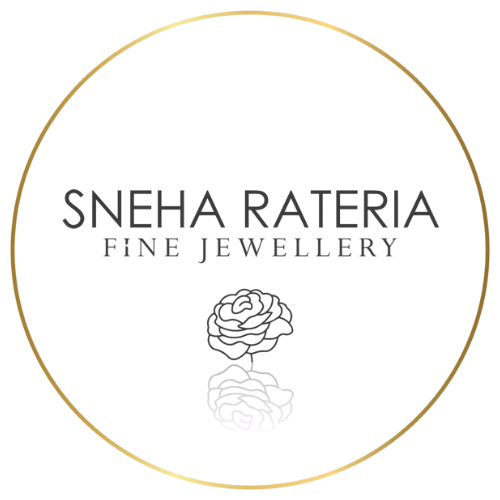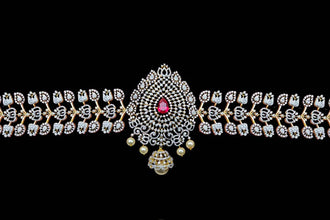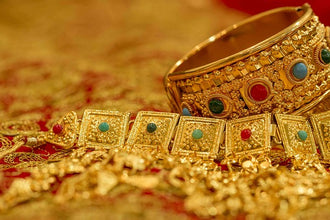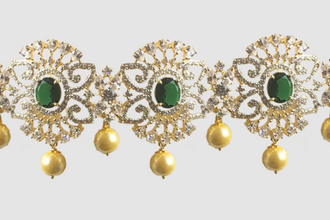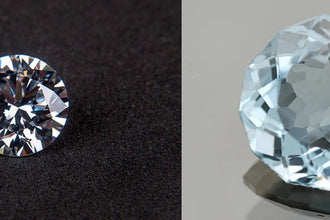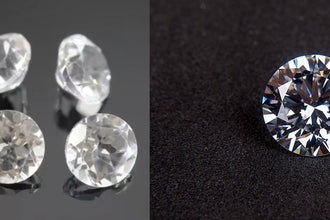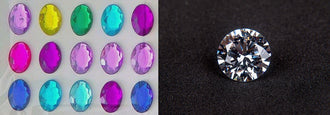
When it comes to choosing a beautiful gemstone for jewelry, two popular options are white sapphire and cubic zirconia. Both stones have their unique qualities and appeal, making them great alternatives to diamonds. In this blog, we will explore what white sapphire and cubic zirconia are, how they differ, and the important factors to consider when selecting a white sapphire. Whether you're looking for an engagement ring or a stunning piece of jewelry, understanding these gemstones will help you make an informed choice.
What is White Sapphire?
White sapphire is a colorless variety of the mineral corundum. It has the same chemical composition and crystal structure as blue sapphire, but it lacks the trace elements that give blue sapphire its distinctive color. White sapphire is sometimes called "colorless sapphire" or "water sapphire."
What is Cubic Zirconia?
Cubic Zirconia, often abbreviated as CZ, is a synthetic gemstone that closely resembles a diamond in appearance. It is made from zirconium dioxide, a crystalline material that is created in a laboratory setting. Cubic Zirconia is known for its brilliance, fire, and durability, making it a popular and affordable alternative to natural diamonds.
Difference between White Sapphire and Cubic Zirconia
Here are the key differences between white sapphire and cubic zirconia:
Sourcing
- White sapphires are naturally mined from the earth or can be created in a lab. - Cubic zirconia is always made in a lab by melting minerals together at very high temperatures.
Hardness
- White sapphires score a 9 on the Mohs hardness scale, making them very hard and scratch-resistant. - Cubic zirconia scores 8-8.5 on the Mohs scale, so it is slightly softer and more prone to scratches.
Durability
- White sapphires are very durable and can last a lifetime with proper care. - Cubic zirconia can last a long time too if cared for, but is more likely to get scratched or damaged over many years of wear.
Brilliance
- Cubic zirconia has a higher refractive index, so it sparkles and shines more brightly at first. - White sapphires have less brilliance and fire compared to diamonds or cubic zirconia.
Price or Cost
- Both white sapphires and cubic zirconia are less expensive alternatives to diamonds. - White sapphires are usually more expensive than cubic zirconia of the same size.
In summary, while white sapphires and cubic zirconia look similar, white sapphires are more durable and retain their color better, while cubic zirconia is more brilliant at first. The choice depends on your budget and preferences.
The 4 C's of White Sapphire
When choosing a white sapphire, it's essential to understand the 4 C's: Cut, Color, Clarity, and Carat. Here's a simple breakdown of each:
Cut
The cut refers to how well the sapphire has been shaped and polished. A good cut enhances the stone's sparkle and brilliance. A well-cut white sapphire reflects light beautifully, making it more eye-catching.
Color
While white sapphires are generally colorless, they can have slight hints of color. The best white sapphires are completely colorless or have a very faint tint. A pure, colorless sapphire is usually more valuable and desirable.
Clarity
Clarity measures how clear the sapphire is, meaning how many inclusions (internal flaws) or blemishes (external flaws) it has. A higher clarity rating means fewer visible imperfections. The clearer the stone, the more beautiful and valuable it is.
Carat
Carat refers to the weight of the sapphire, not its size. Larger sapphires are rarer and often more valuable. However, the quality of the cut, color, and clarity also significantly affects the overall value.
Understanding these 4 C's can help you choose the perfect white sapphire for your needs.
Do White Sapphires Sparkle Like Diamonds?
White sapphires are often compared to diamonds due to their similar appearance, but they have distinct qualities that affect their sparkle. While both gemstones can shine brightly, diamonds are renowned for their exceptional brilliance, which comes from their unique crystal structure and high refractive index. This means that diamonds reflect light in a way that creates a dazzling sparkle.
White sapphires, on the other hand, have a softer shine and may appear less vibrant because they lack some of the fire and brilliance that diamonds possess. However, white sapphires can still be beautiful and eye-catching, offering a more understated elegance. In summary, while white sapphires do sparkle, they do so in a different way than diamonds, making each gemstone special in its own right.
White Sapphire Engagement Rings
White sapphire engagement rings are a stunning and affordable choice for couples looking to symbolize their love. These beautiful gemstones offer a brilliant sparkle that rivals diamonds, making them an eye-catching option for an engagement ring. Unlike diamonds, white sapphires are generally more budget-friendly, allowing couples to invest in a larger stone or a more intricate setting without breaking the bank.
Additionally, white sapphires are durable and resistant to scratches, ensuring that the ring will last through years of wear. With their clear, radiant appearance, white sapphires can complement any style, from classic to modern, making them a versatile choice for any bride-to-be. Whether set in white gold, yellow gold, or rose gold, a white sapphire engagement ring is a meaningful way to celebrate your unique love story.
Conclusion
White sapphires and cubic zirconia offer wonderful options for those seeking beautiful and affordable gemstones. While white sapphires are known for their durability and subtle elegance, cubic zirconia shines brightly with its impressive sparkle. By considering the 4 C's—cut, color, clarity, and carat—you can find the perfect white sapphire for your needs.
Whether you choose a white sapphire engagement ring or another piece of jewelry, both options will add a touch of beauty and meaning to your collection. Ultimately, the choice between these two gemstones depends on your personal style and budget, ensuring that you can find something special that fits your unique taste.
FAQs
1. Are White Sapphires Good for Engagement Rings?
White sapphires can make beautiful and affordable engagement rings, but they are softer and less durable than diamonds.
2. Are White Sapphires Better Than Cubic Zirconia?
White sapphires are a more affordable alternative to diamonds, but they are not as brilliant or durable as diamonds or moissanite.
3. Do White Sapphires Get Cloudy?
White sapphires can develop a cloudy appearance over time due to their softer nature and susceptibility to scratches and chips.
4. What are Lab-Created White Sapphires?
Lab-created white sapphires are man-made stones that are chemically, physically, and optically identical to natural white sapphires but are more affordable and consistent in quality.
5. Can white sapphires fade in color?
No, white sapphires retain their brilliance and do not fade over time, unlike cubic zirconia which can lose luster.
6. How are white sapphires sourced?
White sapphires are mined from natural deposits, while cubic zirconia is entirely lab-created.
7. Do both stones have the same sparkle?
Cubic zirconia typically has a more intense sparkle due to its higher refractive index, while white sapphires have a more subdued glow.
8. What is the average lifespan of cubic zirconia?
Cubic zirconia can last several years with proper care but may show signs of wear over time, while white sapphires can last a lifetime.
9. Is there a significant price difference between the two?
Yes, white sapphires are usually more expensive due to their natural origin and rarity compared to the more affordable cubic zirconia.
10. How do the two stones perform in different lighting conditions?
Cubic zirconia tends to sparkle more in low light, while white sapphires have a more consistent shine in various lighting conditions.
